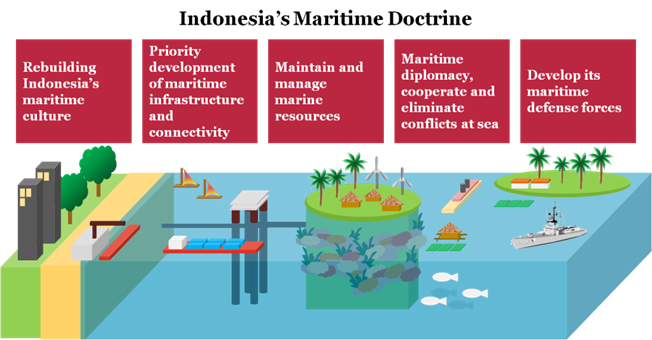
Background
In his speech at the 9th East Asia Summit held in Nay Pyi Taw, Myanmar, on 13 November 2014, President Joko Widodo (Jokowi) affirmed Indonesia’s concept as Global Maritime Fulcrum (GMF). This concept was delivered at the said forum because for Indonesia, East Asia Summit plays an important role for security, stability, and economic prosperity in the region.
As the largest archipelagic country in the world, Indonesia has great potential to become the GMF. The development agenda as the GMF will be focused on five main pillars, namely: to rebuild the maritime culture, manage the marine resources, develop the maritime infrastructure and connectivity, advance the maritime diplomacy, and strengthen naval defence forces.
Problems
Indonesia understands the importance of maritime aspect for both the security of the country and the prosperity of its people. Both aspects are taken into consideration by President Jokowi when initiating the concept of Indonesia as the GMF between the Indian and Pacific Oceans.
At present, President Jokowi is facing challenges in coordinating the maritime affairs. There are a number of national agencies/stakeholders related to maritime security affairs which needs to be managed including the navy, the transportation ministry, and the maritime affairs and fisheries ministry. In the past, coordination has been difficult among them due to conflict of interests, competing for authority and resources. In addition, the absence of foreign policy strategy in maritime diplomacy is also a challenge in creating a GMF.
Objective
This paper will briefly discuss President Jokowi’s vision to make Indonesia as the GMF in order to become a developed, sovereign, independent, strong maritime nation, which is able to give positive contribution for peace and security in the region and the world in accordance to its national interests. The paper will also shortly cover the problem arising from the said vision, followed by trend analysis, and also policy options on the steps to be taken by the government to actualize the GMF. The paper will be concluded with a policy recommendation.
Trend Analysis
The Government of Indonesia has published a document titled Buku Putih Poros Maritim Dunia (GMF White Paper) that finally brings an authoritative voice to Indonesia’s GMF vision. The objective of the white paper is to construct a narrative on the importance of the seas to Indonesia, the future trajectory of the GMF as Indonesia’s maritime vision, and the possible ways to achieve those ambitious ends.
Even though the concept of the GMF was introduced by President Joko Widodo, the policy objectives stated in the White Paper came from the Archipelagic Outlook (Wawasan Nusantara). The Archipelagic Outlook concept was conceived due to the disadvantages brought upon Indonesia as an archipelagic state prior to the implementation of the Djuanda Declaration in the UN Convention on the Law of the Sea (UNCLOS).
The genesis of the Archipelagic Outlook is an inherently inward-looking concept. This introverted stance cannot be sustained in this age of interconnectivity. It also cannot be maintained as a guideline if Indonesia were to start expanding beyond the archipelago and seek to influence its surrounding environment. Thus, GMF aims to address the shortcomings of the Archipelagic Outlook.
The GMF White Paper also asserts maritime identity in Indonesia. There are already some concrete examples of Indonesia’s attempt to break free from the Archipelagic Outlook’s introverted nature at defence and diplomacy dimensions. In diplomatic realms, President Jokowi has strived to improve relations with bilateral and multilateral partners on maritime-related issues.
Policy Options
President Jokowi had established the Coordinating Minister for Maritime Affairs and Maritime Security Agency (Badan Keamanan Laut, BAKAMLA), to assist him in attaining his vision of Indonesia as GMF. Unsurprisingly, there is still a significant maritime coordination challenges to manage several national agencies/stakeholders related to maritime issues.
To address the issue, there are three policy options that the Ministry of Foreign Affairs should consider in order to support President Jokowi’s goal to achieve the GMF vision.
First, with regards to the coordination issue, President Jokowi must give more mandate to the Coordinating Ministry for Maritime Affairs and BAKAMLA, to direct the realization of GMF’s vision. This can be done, among others, through the establishment of a Task Force that oversees the implementation of the President’s vision and developing of technical rules regarding the implementation of the five pillars of GMF. The Ministry of Foreign Affairs may participate in this Task Force to provide significant inputs related to international cooperation.
Second, Indonesia must promote maritime diplomacy in order to solve maritime border dispute with neighbouring countries, such as the Philippines, Malaysia, and Australia. If these border issues can be resolved properly, it will be easier to get support from neighbouring countries in order to achieve Indonesia’s GMF vision. In terms of maritime diplomacy, the role of the Ministry of Foreign Affairs should be further improved. For example, Indonesia needs to engage with India as a potential partner in Indian Ocean Rim Association (IORA), and also with Australia and China to enhance maritime cooperation, especially in fisheries management. Indonesia should also take advantages from the cooperation with the IMO, especially in the field of training and education as well as through technical cooperation.
Third, although the state’s finance is not conducive, however requesting additional budget to strengthen the main tool of the naval arsenal system to show off the military power, will support Indonesia’s GMF. The Ministry of Foreign Affairs should assist in attracting foreign investment in the development of the country’s maritime infrastructure and defence industry.
Recommendation
Considering the above-mentioned options, it is recommended that the first and second options be prioritized since both are complementing each other and in line with President’s priority to shape Indonesia as a GMF. Inward approaches in strengthening Indonesian maritime forces, and simultaneously using an outward approach through bilateral and multilateral cooperation, will return Indonesia’s identity as a maritime nation and as an indisputable power in the region.